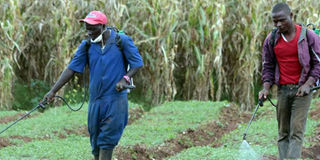Pyrethrum farmers want inclusion in efforts to revive sector

Farmers spray pyrethrum seedlings in a farm in Turi, Nakuru County, on November 16, 2017. Governors in pyrethrum-growing areas want to resuscitate the sector. PHOTO | AYUB MUIYURO | NATION MEDIA GROUP
What you need to know:
- A lobby has warned that sidelining pyrethrum farmers in the formation of the bloc would stall the project.
- A grower from Subukia said what the farmers urgently require is clean planting material and good prices for their dried flowers.
Governors of 18 pyrethrum-growing counties have begun talks on establishing an economic bloc to help revive the industry.
This comes as farmers and other stakeholders demand inclusion in the discussions.
The counties where the crop is grown are Nakuru, Narok, Nyandarua, Nyeri, Meru, Laikipia, West Pokot, Uasin Gishu, Elgeyo-Marakwet, Nyamira, Kisii, Bomet, Kericho, Kiambu, Trans Nzoia, Murang’a, Kirinyaga and Bungoma.
TALKS
Nakuru Governor Lee Kinyanjui, one of the leaders spearheading the programme, said:
“This bloc is critical. As soon as the political tension in the country subsides, we shall start rolling out the revival programme in our counties.”
This will be the second attempt by governors of pyrethrum-growing regions to come together in efforts to revive the struggling sector.
Last year, the governors held similar talks and had the support of the Agriculture ministry.
FUNDING
Mr Kinyanjui cited underfunding of the industry by counties and the national government as one of the main challenges that need to be addressed.
“The pyrethrum sector requires massive funding. Just like the way the government is spending billions of shillings in the coffee and sugar sectors, the pyrethrum industry must be allocated enough funds to save it from the quagmire,” he said.
Lack of clean planting material, lack of stringent liberalisation structures to guide the sector and lack of marketing strategies are some of the other challenges that may hinder the economic bloc from taking off.
INCLUSION
A lobby has warned that sidelining pyrethrum farmers in the formation of the bloc would stall the project at birth.
“The proposed bloc will not succeed if farmers are not at the center of the initiative,” Pyrethrum Growers Association (PGA) chairman Justus Mochache Monda said.
He said growers must be given a leading role as they are the major stakeholders and have borne the brunt of mismanagement in the sector for a long time.
“It would be foolhardy to ignore the growers in such a mega project and still expect pyrethrum farming to blossom once again,” said Mr Monda.
PRODUCTION
The PGA said the farmers’ morale is at its lowest, leading to an all-time low production of about 300 tonnes against a high of 18,000 tonnes in the 1980s and 1990s.
The group urged counties to study the national agricultural policies and harmonise their various manifestos as they work on forming the bloc.
“If this ambitious project is not crafted alongside the country’s Vision 2030 economic blueprint, it will stall,” Mr Monda said.
“This is a brilliant idea, but the PGA wants a chance to engage in the dialogue on the revival mechanism.”
SCEPTICISM
At the same time, some farmers have doubted the sincerity of the governors pushing for the programme.
“My worry is that innocent growers may be used to siphon taxpayers’ money to fund a non-viable project,” Mr Reuben Makori, a pyrethrum farmer in Molo, said.
He said the government has so far spent more than Sh2 billion to resuscitate the ailing sector but farmers are yet to reap the fruits of such massive funding.
BUDGET
Mr Simeon Muhoro, a grower from Subukia, said what the farmers urgently require is clean planting material and good prices for their dried flowers.
“These talks of forming an economic bloc are not what the farmers are dying for at the moment.
"If they were talking about buying more planting material, that would be of great benefit to farmers,” Mr Muhoro said.
“The agriculture docket should be allocated at least 10 per cent of the total county budget in line with international standards,” Mr Monda added.





